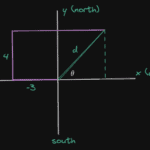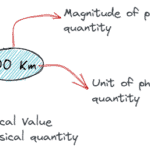Question: In an experiment the percentage errors in the measurements of physical quantities $A,B,C,D$ are $1\%$, $2\%$, $3\%$ and $4\%$ respectively. If
$$
X=\frac{A^{2}B^{1/2}}{C^{1/3}D^{3}},
$$
the maximum percentage error in $X$ is:
a. $10\%$
b. $(3/13)\%$
c. $16\%$
d. $1\%$
Answer. c. $16\%$
Solution. Maximum percentage error in $ X $:
$$
\left( \frac{dX}{X} \right) \times 100 = \left( 2 \frac{dA}{A} + \frac{1}{2} \frac{dB}{B} + \frac{1}{3} \frac{dC}{C} + 3 \frac{dD}{D} \right) \times 100
$$
$$
= 2 \times 1 + \frac{1}{2} \times 2 + \frac{1}{3} \times 3 + 3 \times 4 = 16\%
$$
Each term in the error expression corresponds to the power of the variable multiplied by its relative error, summed, and then multiplied by 100 to express it as a percentage.
The formula shows how to calculate the maximum percentage error in $ X $ if the percentage errors in $ A, B, C, D $ are 1%, 2%, 3%, and 4% respectively.





